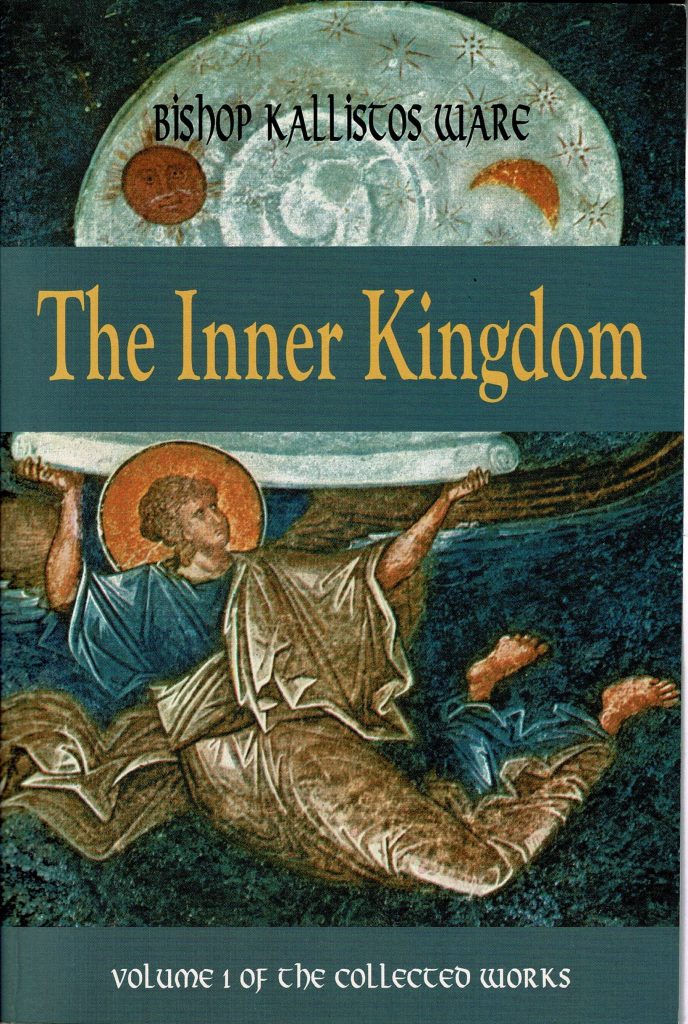
On Thursday mornings we are currently reading The Inner Kingdom by Bishop Kallistos (as he was when it was published by St Vladimir’s Seminary Press in 2000). It is proving an extremely insightful text.
It is a selection of previously published essays, although they have now been edited for this volume.
Metropolitan Kallistos, as he now is, puts into words what we know in our hearts but are unable to express, simply because we are dealing with the inexpressible. Here is the answer he gives in the chapter on The Theology of Worship to questions frequently asked but the answers given are always inadequate.
“Why offer incense or burn candles? Why make prostrations or the sign of the Cross? If we attempt a verbal explanation, we know perfectly well that it embodies only a small part of the truth. And that, surely, is precisely the reason for the symbolic action. If the poet could express in plain prose what he has said in poetry, if the artist or musician could express in words what she has said in paint or sound, then there would be no need for the poem or picture or symphony. Each exists because it expresses something which cannot be expressed in any other way. So it is in worship. If it were possible to say in words why we burn candles or burn incense, then we could rest content with the verbal explanation and forego the symbolic act altogether. The whole value of the the symbol in worship is that it expresses something which cannot be said through the spoken word alone, that it reaches a part of our being which cannot be touched by rational arguments. The symbol is on the one hand simpler and more immediately accessible than a verbal explanation, and on the other hand it penetrates more deeply into the heart of reality” (page 65)
He quotes Dostoevsky: “Beauty will save the world” and Archpriest Alexander Schmemann:
“The liturgy is, before everything else, the joyous gathering of those who are to meet the risen Lord and to enter with Him into the bridal chamber. And it is this joy of expectation and this expectation of joy that are expressed in singing and ritual, in vestments and in censing, in the whole “beauty” of the liturgy, which has so often been denounced as unnecessary and even sinful.
“Unnecessary it is indeed, for we are beyond the categories of the “necessary.” Beauty is never “necessary,” “functional” or “useful.” And when, expecting someone whom we love, we put a beautiful tablecloth on the table and decorate it with candles and flowers, we do all this not out of necessity, but out of love. And the Church is love, expectation and joy. It is heaven on earth, according to our Orthodox tradition; it is the joy of the recovered childhood, that free, unconditional and disinterested joy which alone is capable of transforming the world. In our adult, serious piety we ask for definitions, justifications, and they are rooted in fear. Fear of corruption, deviation, “pagan influences,” whatnot. But “he that feareth is not made perfect in love” (1 Jn 4:18). As long as Christians will love the Kingdom of God, and not only discuss it, they will “represent” it and signify it, in art and in beauty. And the celebrant of the sacrament of joy will appear in a beautiful chasuble, because he is vested in the glory of the Kingdom, because even in the form of man God appears in glory. In the Eucharist we are standing in the presence of Christ, and like Moses before God, we are to be covered with His glory.” (p. 66)
Metropolitan Kallistos is one of the most inspiring theologians of our time and has been responsible for the enlightenment of many people over the last five or six decades, through his writings and lectures.
We are looking forward to the next chapter, ‘A Sense of Wonder’ when returning to routine after the feast of Theophany. In the meantime, as we celebrate the Nativity of the Lord, his words will certainly help us have a sense of wonder.
We read and discuss a book together each Thursday after intercession prayer every Thursday morning at 10.30am. All our welcome to join.
Presvytera Catherine